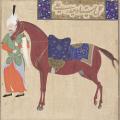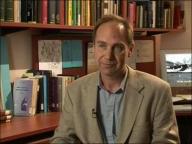184 - Robert Wisnovsky on Commentary Culture
Robert Wisnovsky joins Peter to discuss the enormous body of unstudied philosophical commentaries in the later Eastern Islamic world.
Themes:
• R. Wisnovsky, “Notes on Avicenna’s concept of thingness (shayʾiyya)”, Arabic Sciences and Philosophy 10 (2000), 181-221.
• R. Wisnovsky (ed.), Aspects of Avicenna (Princeton: 2001).
• R. Wisnovsky, Avicenna’s Metaphysics in Context (London: 2004).
• R. Wisnovsky, “One aspect of the Avicennian turn in Sunnī theology”, Arabic Sciences and Philosophy 14 (2004), 65-100.
• R. Wisnovsky, “The nature and scope of Arabic philosophical commentary in post-classical (ca. 1100-1900 AD) Islamic intellectual history: Some preliminary observations,” in P. Adamson, H. Baltussen and M.W.F. Stone (eds), Philosophy, Science and Exegesis in Greek, Arabic and Latin Commentaries (London: 2004), 149-91.
• R. Wisnovsky, “Arabic logicians on perfect and imperfect syllogisms: A supplement to Patzig’s ‘Historical Excursus,’” in T. Langermann (ed.), Avicenna and his Legacy: A Golden Age of Science and Philosophy (Turnhout: 2010), 257-73.
• R. Wisnovsky, F. Wallis, J. Fumo and C. Fraenkel (eds), Vehicles of Transmission, Translation and Transformation in Medieval Textual Culture (Turnhout: 2012).
• R. Wisnovsky, “Avicenna’s Islamic reception”, in P. Adamson (ed.), Interpreting Avicenna: Critical Essays (Cambridge: 2013), 190-213.
Post-Classical Islamic Philosophy Database directed by Prof Wisnovsky







Comments
A Comment on Commentaries
Loved the episode!! Really interesting stuff.
If one wanted to begin researching this area, where should one start? Are there any catalogues or lists of these commentaries and their authors? And are there any databases online etc. where you can access some of these works, or do you have to go and look at the physical copies?
In fact the situation you describe about the vast amount of neglected later philosophical commentaries is much the same as the current situation with early modern period (early 17th c. to mid 19th c.) Japanese commentaries on Chinese Neo-Confucian texts. I'm doing Ph.D research at the moment looking at Japanese commentaries on the Song period anthology 'Reflections on Things at Hand', and there are dozens and dozens of commentaries in printed and manuscript form spread out in institutions all over Japan. And no one is studying them! An entire corpus of works in Japanese and East Asian intellectual history is for the most part being completely neglected. Oh well, at least that means more fun for those of us that are interested heh heh.
In reply to A Comment on Commentaries by Jeremy
Commentaries
Yes, and the same is true in India. (If I ever tackle Japanese philosophy you will have to give me some advice, by the way.)
For this topic I would start with Wisnovsky's article mentioned above, "The Nature and Scope..." If you email me at my Munich email address, I can actually give this to you as a .pdf. This gives you a list of the commentaries; a lot of the secondary literature mentioned on the podcast pages for this series on the Eastern traditions deals with issues in the commentaries.
In reply to Commentaries by Peter Adamson
Great, thanks very much!
Great, thanks very much!
I just sent an email to the Munich address.
And of course I'd be happy to give any tips about looking into Japanese philosophy.
In reply to Commentaries by Peter Adamson
Just a side note on an
Just a side note on an interesting topic, are you aware of Chinese Islamic philosophy? There are a number of unique thinkers from the 17th, 18th centuries who developed their philosophy under the influence of Sufism, Avicenna, Averroes,(possibly Illuminationism as well), and added to this ideas from Lao Tzu and Neo Confucianism. I find these thinkers particularly interesting for how they developed a vocabulary for describing Islamic/Aristotelian concepts with terms borrowed from traditional Chinese philosophy. Below are a couple of recent works in English on this subject just in case anyone is interested. I'm not sure about works in other European languages, but there are a fair number of books and articles in Chinese and Japanese.
Murata, Sachiko 'Chinese Gleams of Sufi Light: Wang Tai-Yu's Great Learning of the Pure and Real and Liu Chih's Displaying the Concealment of the Real Realm', SUNY Press 2000
Murata, S. et al; 'The Sage Learning of Liu Zhi: Islamic Thought in Confucian Terms', Harvard 2009
Further Reading
Thanks for the very interesting Episode! It was very inspiring for me since I work with commented manuscripts from the islamicate world. Since they hide intriguing clues on the way scholars and non-scholars worked with texts and thoughts I would like to find more literature on the topic, but I could not find any. Is there a monography or articles on the topic?
In reply to Further Reading by Johannes Ruhstorfer
Commentaries
I am not sure there is a general book on the whole phenomenon, which is probably too vast for a single monograph. But I would recommend the work of Sabine Schmitdke, Reza Pourjavady, and Wisnovsky of course; and for logical commentaries Khaled el-Rouayheb and Asad Ahmad.
Add new comment